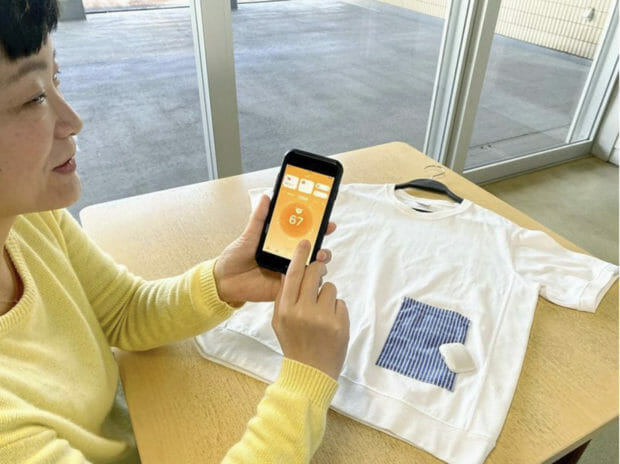Japan’s wearable devices aim to promote better sleep, running form

A device that comes with Xenoma’s shirt affixed into the blue pocket measures health and other information when sleeping in it. The next morning, a sleep quality score is displayed on a smartphone, as seen at the start-up’s headquarters in Ota Ward, Tokyo. The Japan News/Asia News Network
TOKYO — Having trouble sleeping? Before heading to a specialist, perhaps wearing something new to bed can help.
Just make sure it’s electric.
Xenoma Inc., a Tokyo-based start-up spun off from the University of Tokyo, in May launched the e-skin Sleep Tshirt that is worn to bed to provide sleep diagnosis.
A patch of fabric embedded with flexible electronic circuits is sewn into the pocket on the front of the shirt at the abdomen. The shirt comes with a small electronic device that is affixed in the pocket. The device can measure heartbeat, body movements and temperature on the shirt’s interior. The data are analyzed using an app downloaded onto a smartphone that is linked to the device.
Sleep quality is evaluated on a 100-point scale. The app gives advice on how to improve the score.
“My sleep had been light and I felt sluggish more often during the day,” said Daisuke Kobayashi, 51, a company executive in Kobe who bought the shirt in September. “I wanted to improve the quality of my sleep.”
His sleep score has fluctuated from day to day depending on his work, but his score on Nov. 16 was 60.
“The app has made me more aware of my need to get a good night’s sleep, such as by going to bed earlier and waking up earlier,” he added.
Fashion retailer Urban Research Co. is also selling originally designed pajamas that use the same device.
“Just by wearing the product, customers can easily monitor their sleep status,” said Xenoma’s Misako Tatsuyama, who is in charge of public relations. “It’s popular among health-conscious people in their 30s and 40s.”
Listen to your shoes
Wearable technology is often associated with watches and glasses, but with the spread of flexible, stretchable sensors, there has been an increase of wearables in clothing.
The sophistication in fabrics has been especially remarkable, leading to the development of a variety of smart textiles with sensory functions.
According to a report released by Yano Research Institute Ltd. in August last year, the domestic smart textile market in 2020 was expected to grow 72% from the 2019 level to ¥487 million, and in 2030 it is expected to grow to 47 times the 2020 level to ¥22.681 billion.
Kyoto-based Mitsufuji Corp.’s hamon is a shirt made of silver-plated fibers that conduct electricity. By acquiring and analyzing biometric information such as heart rate, the shirt can visualize health risks by sending information to a smartphone.
In May last year, the Kyoto prefectural government adopted hamon to manage changes in the physical condition of overnight patients with COVID-19 and to prevent secondary infections among staff such as nurses.
Hamon is also being used in an increasing number of cases to manage the physical condition of workers at construction sites under the hot sun. The health data can be monitored remotely by site supervisors, so it is said to be useful in preventing some health incidents.
Kobe-based Asics Corp. and Tokyo-based start-up Orphe Inc. have developed Evoride Orphe shoes that give advice on proper form while the wearer is running.
Sensors built into the cushioned part of the shoe acquire data such as stride length and ankle angle. The data is immediately analyzed by a dedicated smartphone app, which vocally tells the user how to run in a way that suits the person. It also displays tips on how to improve and practice running technique. In a way, the shoes become a personal trainer.
Diversifying roles
Smart wear is also expected to play a role in supporting the aging society amid the low birthrate.
In January this year, Nagoya-based textile trading company Toyoshima & Co. launched the Wearable Smart Town Kurumi Project, which aims to solve regional issues. The first step is to promote the use of smart wear as part of local governments’ health and welfare measures.
Toyoshima signed a partnership agreement with Iwaki, Fukushima Prefecture, that same month. They have started using such wear to watch over sleeping children in nursery schools and for citizens’ physical training projects.
“By visualizing the effects, we can increase understanding of the measures and realize a safe, secure, healthy society,” said Chihiro Izumi, an official of Toyoshima.
The applications of wearable devices are diversifying and the places where they can be worn are expanding.
However, Hiroshi Ashida, a fashion critic and associate professor at Kyoto Seika University, said: “Currently, wearable device users are still limited to those who seek specific functions. If something is developed that everyone can find value in, such as a fashionable jacket that adjusts the temperature accordingly, these items may spread rapidly.”
RELATED STORY
Japanese wearable sensors know if worker is bored, working, or happy